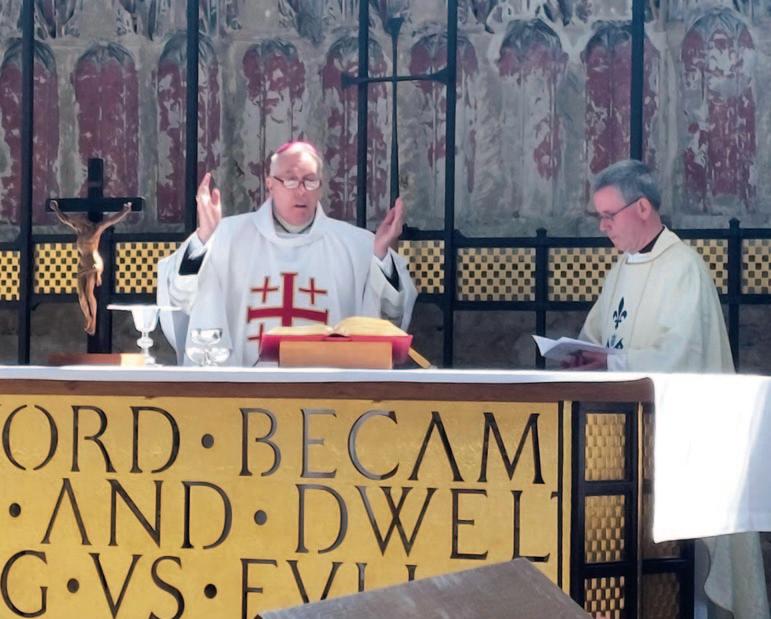
3 minute read
Catholic teacher is named a local hero
A Norfolk Catholic deputy headteacher has been acclaimed as a local hero for her support of a Ukrainian colleague during the hardest year of her life, following the Russian invasion of her country.
n Deputy head at St Martha's Primary school in King’s Lynn, Hayley Pink, was nominated for a Local Hero Award by school teaching assistant Tanya Mikulova for “the kindness, care, support and friendship she has given me during the hardest year of my life.”
“I am a British citizen originally from Ukraine and when the Russian invasion started in February, Hayley was the one who always stood by my side to help me get through all the nightmares and fears related to it,” said Tanya. “I suffered from severe depression, lost my ability to sleep which made me extremely ill and I couldn't continue with my role as a teaching assistant. Every day Hayley cared about me and my mental health which encouraged me to think positive for the future of my family in Ukraine and take little steps at a time for my own recovery.”
Hayley, who has been a teacher for 30 years, was named the Teacher of the Year winner at the Local Hero Awards 2023 ceremony at King’s Lynn Corn Exchange on Wednesday April 26 in an event hosted by Your Local Paper (Iliffe Media) with support from West Norfolk Council and local businesses.
She was presented with her award by Olympian, TV presenter and motivational speaker Sharron Davies MBE. Hayley said: “I felt absolutely honoured and really humbled to accept the award. There were a lot of nominations so just to have been shortlisted was incredible, then to win, was unbelievable.
(formerly known as Apostleship of the Sea).
To donate, go to www.stellamaris.org.uk/donate

Challenge to put the Synodal Way into practice
n The Continental Stage of the Synodal Way has officially ended with the challenge now to put it into practice, says Dcn Huw Williams.
This new stage in preparing for the Synod of Bishops was a real process of listening and discernment at a continental level.
The question that formed the basis for these assemblies was the same question of the synodal process as a whole: How is our ‘walking together’ which enables the Church to proclaim the Gospel in accord with the mission entrusted to her, being achieved today?
The seven assemblies were all representative of the People of God including bishops, priests, consecrated men and women and laity. The fruit of their discus-
“I really felt it wasn't just an award for me, but for the whole staff team at St Martha's including the support staff, midday assistants, cleaners and teachers. It is just sions is in the final document that each assembly produced and will serve as a contribution to the work of the first session of the Synod of Bishops – now due to take place in October 2024.
The European Assembly’s final document is now available online at: prague.synod2023.org/en/final-document/
The seven continental documents will form the basis of the Instrumentum Laboris, the working document for the Synod of Bishops. The document is expected to be available and presented by the end of May.
The participants in the Synod are to include a group of 70 “non-bishop” members among whom will be lay people appointed directly by the Pope. Of these “non-bishop” members, half will be women and there will be several young people. All 70 will enjoy voting rights: there will be around 370 voting members out of more than 400 total participants.
The conclusion of the consultation does not mean the end of the synodal process within the People of God, nor does it mean the interruption of the dialogue between the such a wonderful environment to work in, with such a family feel about it. I've been there for 18 years, the school holds a really special place in my heart.” universal church and the diocese. Rather, it means leaving the local communities – us – with the challenge of putting the synodal way into practice in the daily routine of our Church in East Anglia, in the knowledge that much of what has been discussed and identified so far at the local level does not require the discernment of the universal church nor the intervention of the Magisterium of Peter.
As a diocese, and within our parishes, we need to be continually asking ourselves the same question ‘how is our walking together enabling the mission of the Church to be fulfilled?’, especially amongst those most in need. Are we discerning the voice of the Holy Spirit regarding our future direction? Are we continuing to enable a listening process to take place within our parish settings? Are we reaching out in the love of Christ to those in need?
We are all called constantly to listen to one another in order to hear the promptings of the Holy Spirit, who comes to guide us, breathing life and vitality into the Church. Let us continue our synodality, our journeying together.










